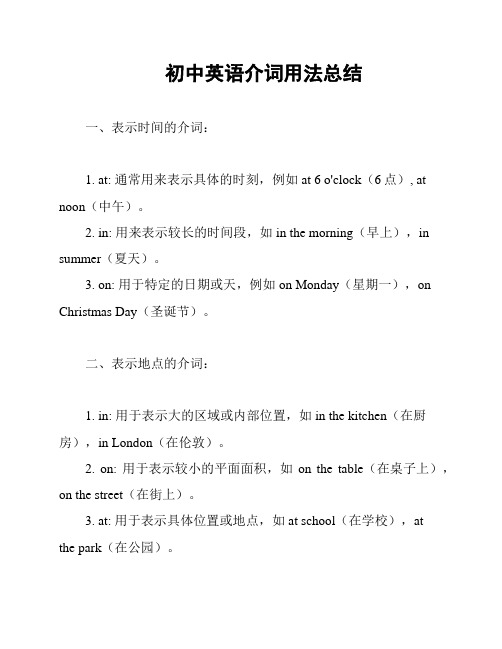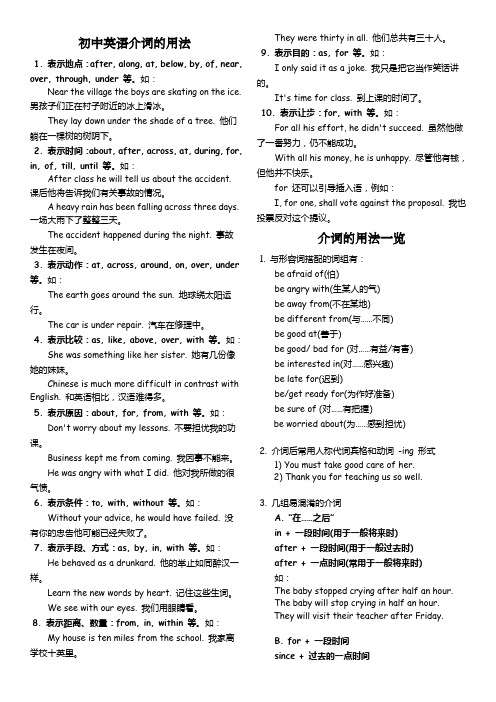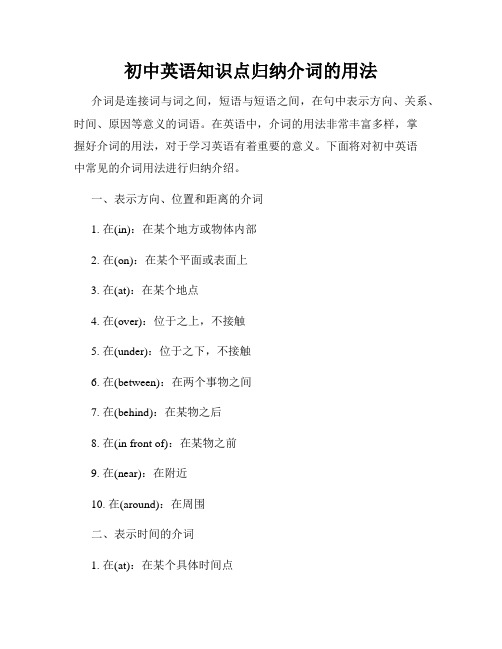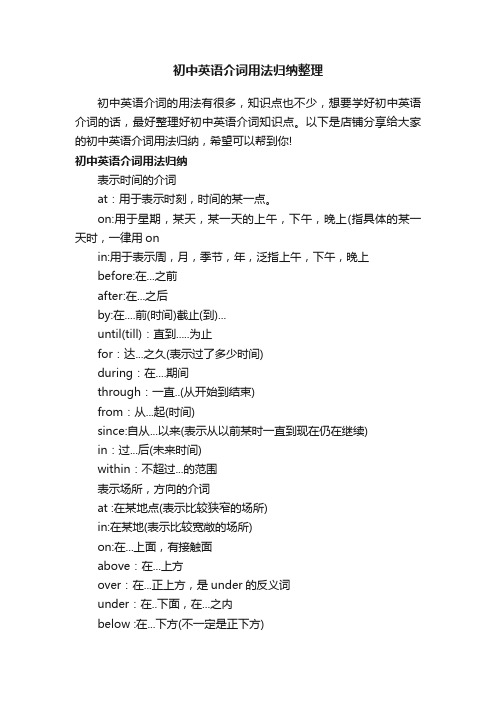(完整版)初中英语介词用法总结
初中英语介词的用法

介词的用法与规则一. 表示地点位置的介词1、at ,in, on, to,offat(1)表示在小地方;(2)表示“在……附近,旁边”in(1)表示在大地方;(2)表示“在…范围之内”。
on 表示毗邻,接壤,“在……上面”。
to 表示在……范围外,不强调是否接壤;或“到……”区别:1. in表示A地在B地范围之内。
如:Taiwan is in the southeast of China.2. to表示A地在B地范围之外,即二者之间有距离间隔。
如:Japan lies to the east of China.3. on表示A地与B地接壤、毗邻。
如:North Korea is on the east of China.4. off表示“离……一些距离或离……不远的海上”。
如:They arrived at a house off the main road. New Zealand lies off the eastern coast of Australia补充:树上结的果实、叶子和开的花,用介词on, 鸟儿在树上,用介词in。
2)above, over, on 在……上above 指在……上方,不强调是否垂直,与below相对;比如:The bird is flying above my head.over指垂直的上方,与under相对,但over与物体有一定的空间,不直接接触。
比如:There is a bridge over the river.on表示某物体上面并与之接触。
比如:He put his watch on the desk.3)below, under 在……下面under表示在…正下方比如:There is a cat under the table.below表示在……下,不一定在正下方比如:Please write your name below the line.4)in front of, in the front of 在……前面in front of…意思是“在……前面”,指甲物在乙物之前,两者互不包括;其反义词是behind(在……的后面)。
初中英语介词用法总结

初中英语介词用法总结一、表示时间的介词:1. at: 通常用来表示具体的时刻,例如 at 6 o'clock(6点), at noon(中午)。
2. in: 用来表示较长的时间段,如 in the morning(早上),in summer(夏天)。
3. on: 用于特定的日期或天,例如 on Monday(星期一),on Christmas Day(圣诞节)。
二、表示地点的介词:1. in: 用于表示大的区域或内部位置,如 in the kitchen(在厨房),in London(在伦敦)。
2. on: 用于表示较小的平面面积,如on the table(在桌子上),on the street(在街上)。
3. at: 用于表示具体位置或地点,如 at school(在学校),atthe park(在公园)。
三、表示方式、方式、原因的介词:1. by: 表示通过某种方式或手段,如 by bus(乘公交车),by email(通过电子邮件)。
2. with: 表示伴随或使用某物,如with friends(和朋友一起),with a pen(用一支笔)。
3. for: 表示目的或原因,如 for fun(为了好玩),for the reason (因为...)。
四、表示动作方向的介词:1. to: 表示运动或行动的方向,如 go to school(去学校),send a letter to(寄一封信给)。
2. into: 表示进入某个内部空间,如 jump into the pool(跳进游泳池)。
五、表示关系和连接的介词:1. of: 表示所有关系,如 a photo of my family(我家的照片)。
2. with: 表示随同或具有某种关系,如 a girl with long hair(一位长发的女孩)。
3. to: 表示某种连接或关联,如 the key to the door(开门的钥匙)。
初一英语介词的用法归纳

初一英语介词的用法可以归纳为以下几点:
1.
表示时间:in,on,at。
表示在某年、某季、某月、某周、某天、某个世纪或某个年代时,用in 表达;
表示在具体的某一天或某一天的早上,下午或晚上时,用on 表达;
表示在某个时刻时,用at 表达。
2.
表示方位:in,on,to。
表示在某个范围内,用in 表达;
表示在某个物体的表面或边缘,用on 表达;
表示在某个方向或距离时,用to 表达。
3.
表示方式:by,with,in。
表示使用某种方式或工具时,用by 表达;
表示使用某种东西时,用with 表达;
表示穿着或戴着某种衣物或颜色时,用in 表达。
4.
表示原因:for。
表示因为某种原因或目的而做某事时,用for 表达。
5.
表示除了:except,besides。
表示从整体中除去某部分时,用except 表达;
表示除了某人或某物外还有其他的时,用besides 表达。
以上是初一英语介词的用法归纳,需要强调的是,介词的用法是多样的,具体使用需要根据语境和上下文来判断。
因此,在学习介词时需要多加练习和运用。
初中英语介词的用法

初中英语介词的用法1. 表示地点:after, along, at, below, by, of, near, over, through, under 等。
如:Near the village the boys are skating on the ice. 男孩子们正在村子附近的冰上滑冰。
They lay down under the shade of a tree. 他们躺在一棵树的树阴下。
2. 表示时间:about, after, across, at, during, for, in, of, till, until 等。
如:After class he will tell us about the accident. 课后他将告诉我们有关事故的情况。
A heavy rain has been falling across three days. 一场大雨下了整整三天。
The accident happened during the night. 事故发生在夜间。
3. 表示动作:at, across, around, on, over, under 等。
如:The earth goes around the sun. 地球绕太阳运行。
The car is under repair. 汽车在修理中。
4. 表示比较:as, like, above, over, with 等。
如:She was something like her sister. 她有几份像她的妹妹。
Chinese is much more difficult in contrast with English. 和英语相比,汉语难得多。
5. 表示原因:about, for, from, with 等。
如:Don't worry about my lessons. 不要担忧我的功课。
Business kept me from coming. 我因事不能来。
初中英语知识点归纳介词的用法

初中英语知识点归纳介词的用法介词是连接词与词之间,短语与短语之间,在句中表示方向、关系、时间、原因等意义的词语。
在英语中,介词的用法非常丰富多样,掌握好介词的用法,对于学习英语有着重要的意义。
下面将对初中英语中常见的介词用法进行归纳介绍。
一、表示方向、位置和距离的介词1. 在(in):在某个地方或物体内部2. 在(on):在某个平面或表面上3. 在(at):在某个地点4. 在(over):位于之上,不接触5. 在(under):位于之下,不接触6. 在(between):在两个事物之间7. 在(behind):在某物之后8. 在(in front of):在某物之前9. 在(near):在附近10. 在(around):在周围二、表示时间的介词1. 在(at):在某个具体时间点2. 在(in):在某个时间段3. 在(on):在某个具体日期三、表示原因的介词1. 因为(of):表示原因、缘故2. 由于(because of):表示原因、由于四、表示目的、用途和方式的介词1. 为了(in order to):表示目的2. 以便(in order that):表示目的3. 用(with):表示使用的手段或工具4. 通过(by):表示方式、方法5. 以(for):表示目的五、表示比较的介词1. 比较起见(than):表示比较的对象2. 和(with):与某人或某物在一起六、其它常见的介词1. 关于(about):表示涉及某一话题2. 靠(by):表示接近某人或某物3. 经过(through):表示通过某地或某事4. 编写(at):表示在某地工作或活动5. 因(as):表示角色、身份6. 例如(for example):表示举例7. 包括(including):表示包含某物以上是初中英语中常见的介词用法的归纳总结。
熟练掌握这些介词的用法,对于构建正确的句子和语法结构非常重要。
希望能对你的学习有所帮助。
初中英语介词用法归纳整理

初中英语介词用法归纳整理初中英语介词的用法有很多,知识点也不少,想要学好初中英语介词的话,最好整理好初中英语介词知识点。
以下是店铺分享给大家的初中英语介词用法归纳,希望可以帮到你!初中英语介词用法归纳表示时间的介词at:用于表示时刻,时间的某一点。
on:用于星期,某天,某一天的上午,下午,晚上(指具体的某一天时,一律用onin:用于表示周,月,季节,年,泛指上午,下午,晚上before:在...之前after:在...之后by:在....前(时间)截止(到)...until(till):直到.....为止for:达...之久(表示过了多少时间)during:在....期间through:一直..(从开始到结束)from:从...起(时间)since:自从...以来(表示从以前某时一直到现在仍在继续)in:过...后(未来时间)within:不超过...的范围表示场所,方向的介词at :在某地点(表示比较狭窄的场所)in:在某地(表示比较宽敞的场所)on:在...上面,有接触面above:在...上方over:在...正上方,是under的反义词under:在..下面,在...之内below :在...下方(不一定是正下方)near:近的,不远的by:在...的旁边,比near的距离要近between:在两者之间among:在三者或者更多的之中around:环绕,在...的周围,在....的四周in front of:在...的前面behind:在...后边in:在..之内,用于表示静止的位置into:进入out of :和into一样,也表示有一定的运动方向along:沿着across:横过(平面物体)through:贯通,通过to :达到..地点(目的地)或方向for:表示目的,为了.....from:从...地点起其他介词with:和..在一起; 具有,带有; 用某种工具或方法in:表示用什么材料(例如:墨水,铅笔等)或用什么语言。
初中介词的用法归纳

初中介词的用法归纳一、关键信息项1、介词的定义及分类2、常见介词的用法及示例3、介词与动词、形容词的搭配4、介词短语在句中的作用5、易混淆介词的辨析6、中考中对介词的考查重点及题型11 介词的定义介词是一种虚词,用来表示名词、代词等与句中其他词的关系,在句中不能单独作句子成分。
111 介词的分类1、时间介词,如 at、in、on 等。
2、地点介词,如 at、in、on、under、behind 等。
3、方式介词,如 by、with、in 等。
4、其他介词,如 for、of、to 等。
12 常见介词的用法及示例121 at 的用法1、表示在具体的时刻,如 at six o'clock。
2、表示在较小的地点,如 at the bus stop。
122 in 的用法1、表示在较长的时间段,如 in the morning。
2、表示在较大的地点,如 in Beijing。
123 on 的用法1、表示在具体的某一天,如 on Monday。
2、表示在物体的表面,如 on the table。
13 介词与动词、形容词的搭配131 与动词的搭配例如,look at(看)、listen to(听)、arrive in/at(到达)等。
132 与形容词的搭配例如,be interested in(对感兴趣)、be good at(擅长)等。
14 介词短语在句中的作用141 作定语如,The girl in red is my sister (in red 作定语修饰 girl)142 作状语如,He studies hard at night (at night 作状语)143 作表语如,He is in the classroom (in the classroom 作表语)15 易混淆介词的辨析151 in 和 onin 表示在里面,on 表示在上面。
152 at 和 inat 表示在较小的地点,in 表示在较大的地点。
初中英语语法--介词(最新整理)

初中英语语法 --- 介词介词只能用在一个名词、代词或相当于名词的结构之前,也可以与后面的词一起构成介词短语。
介词通常位于名词或代词之前。
常见的介词用法:一.on五.其他常用介词练一练用适当的介词填空morning .2.Do the students stay home S a t u r d a y? 3.M y m o t h e r c u t t h e c a k ea knife4.We live a n e w h o u s e n o w.5.S h a n g h a i i sthe east of China.6.I usually have lunch noon.7.It’s eight o’clock.It’s time class.8.half past six , he usually has dinner.9.We have lessons eight o’clock twelve o’clock.11.There is a bridge the river.12.This is a photo my family.13.Tom comes England.14.My bed is the window.15.He looks his father.16.What's this English?17.The pen is the pencil-box.18.The bookstore is19.There are some pictures the right of our school.the wall.20.My telephone is the bed and the sofa.答案:1. at; in 2.at; on 3.with 4. in 5.in 6.at 7.for 8.At 9.from; to 10. with; by 11. over 12. of 13. from 14. near 15. like 16. in 17. in 18. on 19.on 20.between“”“”At the end, Xiao Bian gives you a passage. Minand once said, "people who learn to learn are very happy people.". In every wonderful life, learning is an eternal theme. As a professional clerical and teaching position, I understand the importance of continuous learning, "life is diligent, nothing can be gained", only continuous learning can achieve better self. Only by constantly learning and mastering the latest relevant knowledge, can employees from all walks of life keep up with the pace of enterprise development and innovate to meet the needs of the market. This document is also edited by my studio professionals, there may be errors in the document, if there are errors, please correct, thank you!。
- 1、下载文档前请自行甄别文档内容的完整性,平台不提供额外的编辑、内容补充、找答案等附加服务。
- 2、"仅部分预览"的文档,不可在线预览部分如存在完整性等问题,可反馈申请退款(可完整预览的文档不适用该条件!)。
- 3、如文档侵犯您的权益,请联系客服反馈,我们会尽快为您处理(人工客服工作时间:9:00-18:30)。
初中英语介词用法总结介词(preposition):也叫前置词。
在英语里,它的搭配能力最强。
但不能单独做句子成分需要和名词或代词(或相当于名词的其他词类、短语及从句)构成介词短语,才能在句中充当成分。
介词是一种虚词,不能独立充当句子成分,需与动词、形容词和名词搭配,才能在句子中充当成分。
介词是用于名词或代词之前,表示词与词之间关系的词类,介词常与动词、形容词和名词搭配表示不同意义。
介词短语中介词后接名词、代词或可以替代名词的词(如:动名词v-ing).介词后的代词永远为宾格形式。
介词的种类:(1)简单介词:about, across, after, against, among, around, at, before, behind, below, beside, but, by, down, during, for, from, in, of, on, over, near, round, since, to, under,up, with等等。
(2)合成介词:inside, into, outside, throughout, upon, without, within(3)短语介词:according to, along with, apart from, because of, in front of, in spite of, instead of, owing to, up to, with reguard to(4)分词介词:considering, reguarding, including, concerning介词短语:构成介词+名词We go to school from Monday to Saturday.介词+代词Could you look for it instead of me?介词+动名词He insisted on staying home.介词+连接代/副词I was thinking of how we could get there.介词+不定式/从句He gives us some advice on how to finish it.介词的用法:一、介词to的常见用法1.动词+toa)动词+ toadjust to适应,attend to处理;照料,agree to赞同,amount to加起来达…,belong to属于,come to达到,drink to为…干杯,get to到达,happen to发生在某人身上,hold to紧握,lead to通向,listen to听,occur to想起,object to反对,point to指向,respond to回答,refer to参考;指的是…;涉及,reply to回答,see to负责,stick to坚持,turn to求助,write to给某人写信。
b)动词(+sth.)+to+sb.announce to通知某人, describe to向某人描述, explain to向某人解释, express to对某人表达, mention to提及, nod to向某人点头, report to报告, say to告知, shout to对某人大叫, suggest to对某人提建议,speak to与某人交谈, talk to跟某人谈话, whisper to和某人低声耳语。
c)动词+sth./sb.+ to +sth./sb.add to增加, compare to比作, carry to运送至, devote to致力于,introduce to介绍给, invite to邀请参加, join to连接到, leave to委托给,reduce to下降至, sentence to判处, take to带到。
2. be +形容词/过去分词+ tobe alive to觉察;晓得,be attentive to注意;留心,be awake to知晓,be blind to缺乏眼光,be close to紧挨着,be common to对某人来说很普通,be contrary to违反;反对,be devoted to致力,be deaf to不愿意听,be equal to有…的力量,be exposed to暴露;遭受,be fair to对…公平,be familiar to对某人来说熟悉,be grateful to对某人心存感激,be good to对…有好处,be harmful to对…有危害,be important to对…重要,be kind to友好对待,be known to周知于,be married to嫁给,be moved to转移到,be near to靠近,be necessary to对…有必要,be opposite to在对面,be opposed to反对,be pleasant to合某人之意,be proper to专属,be polite to礼貌待人,be rude to粗暴对待,be relative to与…有关,be strange to不习惯,be similar to类似,be suitable to适合,be true to忠实,be thankful to感激,be useful to对…有用,be used to习惯。
3.to+名词构成的词组to a degree在某种程度上, to date到现在为止,to one’s feet跳起来,to one’s mind照…看来, to one’s surprise使…吃惊,to one’s taste符合胃口, to oneself独自享用, to order定做,to the letter不折不扣地, to the point中肯地二、at的常见用法at构成的词组比较多,要细心区分。
1.动词+ atarrive at抵达,call at访问某地, catch at(it)当场抓住, come at攻击, fire at向…开火,glance at瞟一眼, glare at怒目而视, grieve at忧伤,knock at敲,laugh at嘲笑, look at看一眼, pull at拉扯, rejoice at对…高兴,smile at向某人微笑, shoot at朝…射击, stare at怒目而视,thrust at刺向, tear at撕, tremble at颤抖,wonder at吃惊,work at工作。
2. be +形容词/过去分词+ atbe angry at恼怒于, be alarmed at对…保持警觉,be astonished at对…吃惊, be bad at不擅长, be clever at对某事很灵巧,be delighted at高兴,be disgusted at厌恶, be disappointed at 对…失望,be good at擅长, be impatient at对…不够耐心, be mad at狂热于,be pleased at对…感到高兴, be present at出席, be satisfied at满意,be surprised at吃惊, be shocked at对…非常震惊,be terrified at受到…的恐吓,be quick at对…很机敏。
3.at+名词构成的词组at a distance在一定距离,at a loss不知所措,at a time一次,at all一点也不,at any cost 不惜一切代价,at best最好也只是,at first起初,at hand手头,at heart在内心里,at home 在家;无拘束,at last最后,at least至少,at most最多,at once马上,at present目前。
三、介词on的常见用法on的用法比较重要,本文介绍它的一些常见用法:1.动词+ona)动词+ on要认真区分下面一些词组act on对…有作用, bring on促使;导致, call on拜访某人,count on依赖, carry on执行,depend on取决, feed on以…为生,figure on料想;推断, go on继续,have on穿着, insist on坚持,keep on 继续, lean on依赖, live on以…为生, pull on迅速穿上,put on穿上, switch on接通(电源), take to喜欢;养成;轻易学会,turn on接通(电源), work on操作, wait on侍候。
b)动词+sb.(sth.)+ on +sb.(sth.)base on以…为基础, congratulate on恭贺, fix on固定, have mercy on怜悯,have pity on怜惜, keep watch on监视, spend on把时间、精力花在某方面。
2.be+形容词+on的词组be dependent on依赖, be hard on对某人苛刻,be impressed on对…印象深刻, be keen on 渴望, be strict on对…严格。
3.on+名词构成的词组on board乘(车,飞机),on call听候召唤, on duty值班, on earth到底, on fire着火, on foot 步行,on guard在岗,on hire雇用,on holiday度假四、介词in的常见用法1.动词+ina)动词+ inbelieve in信任, break in碎成,bring in引起;产生;带来, call in下令收回, fill in填充,get in收获, hand in上缴, involve in涉及, lie in在于, result in导致, share in共享,succeed in成功,take in卷起;订阅, turn in归还当局。
b)动词+sb./time/money+ inhelp sb. in帮助某人做某事, spare time/money in匀出时间或钱做某事,spend time/money in 花时间或钱做某事,waste time/money in浪费时间或钱做某事。
2. be +形容词+ inbe active in活跃于,be absorbed in专心致志, be busy in忙碌, be born in出生于,be concerned in牵涉, be clothed in穿着, be disappointed in对…失望,be diligent in勤于, be experienced in在…有经验, be employed in任职于,be engaged in忙碌, be expert in某方面的专家, be excellent in在…优秀,be interested in对…有兴趣, be lacking in缺乏, be rich in富有,be slow in迟缓, be successful in在某方面成功, be skilled in精于,be strict in严于, be weak in弱于。
